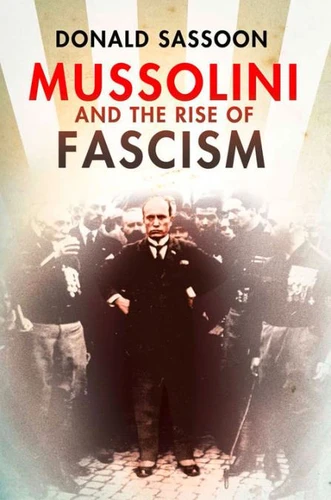Mussolini and the Rise of Fascism (Text Only Edition)
Par :Formats :
Disponible dans votre compte client Decitre ou Furet du Nord dès validation de votre commande. Le format ePub protégé est :
- Compatible avec une lecture sur My Vivlio (smartphone, tablette, ordinateur)
- Compatible avec une lecture sur liseuses Vivlio
- Pour les liseuses autres que Vivlio, vous devez utiliser le logiciel Adobe Digital Edition. Non compatible avec la lecture sur les liseuses Kindle, Remarkable et Sony
- Non compatible avec un achat hors France métropolitaine
 , qui est-ce ?
, qui est-ce ?Notre partenaire de plateforme de lecture numérique où vous retrouverez l'ensemble de vos ebooks gratuitement
Pour en savoir plus sur nos ebooks, consultez notre aide en ligne ici
- Nombre de pages224
- FormatePub
- ISBN978-0-00-740421-6
- EAN9780007404216
- Date de parution27/09/2012
- Protection num.Adobe DRM
- Infos supplémentairesepub
- ÉditeurHarperPress
Résumé
In this fascinating look at the unique conjuncture of factors surrounding Il Duce's seizure of power, eminent historian Donald Sassoon traces the political circumstances that sent Italy on a collision course with the most destructive war of the century.
On the morning of 30 October 1922, Mussolini arrived in Rome to accept the premiership of a constitutional, conservative government. Within five years, however, his regime would morph into a dictatorship that neither his fascist supporters nor the conservative old order could have predicted, and Mussolini himself would be transformed from figurehead to despot.
A multiplicity of personalities and wider impersonal forces, including the social upheaval caused by the previous world war, combined to make possible the crisis of 1922 and the Fascist 'March on Rome'.
But in fact, Donald Sassoon argues, things could have gone very differently and the core focus of this illuminating study is not so much what happened, but how. How did Mussolini seize power so effectively that he maintained it for the next twenty years, until he dragged his country, disastrously, into World War II? Social fragmentation, unionization, inflation and nationalism all played a part in weakening the old political system, while Mussolini seemed to provide answers in a troubling new era.
In the event, Il Duce's ruthless political ambition and cruel authoritarianism would surprise his supporters and opponents alike. Note that it has not been possible to include the same picture content that appeared in the original print version.
But in fact, Donald Sassoon argues, things could have gone very differently and the core focus of this illuminating study is not so much what happened, but how. How did Mussolini seize power so effectively that he maintained it for the next twenty years, until he dragged his country, disastrously, into World War II? Social fragmentation, unionization, inflation and nationalism all played a part in weakening the old political system, while Mussolini seemed to provide answers in a troubling new era.
In the event, Il Duce's ruthless political ambition and cruel authoritarianism would surprise his supporters and opponents alike. Note that it has not been possible to include the same picture content that appeared in the original print version.
In this fascinating look at the unique conjuncture of factors surrounding Il Duce's seizure of power, eminent historian Donald Sassoon traces the political circumstances that sent Italy on a collision course with the most destructive war of the century.
On the morning of 30 October 1922, Mussolini arrived in Rome to accept the premiership of a constitutional, conservative government. Within five years, however, his regime would morph into a dictatorship that neither his fascist supporters nor the conservative old order could have predicted, and Mussolini himself would be transformed from figurehead to despot.
A multiplicity of personalities and wider impersonal forces, including the social upheaval caused by the previous world war, combined to make possible the crisis of 1922 and the Fascist 'March on Rome'.
But in fact, Donald Sassoon argues, things could have gone very differently and the core focus of this illuminating study is not so much what happened, but how. How did Mussolini seize power so effectively that he maintained it for the next twenty years, until he dragged his country, disastrously, into World War II? Social fragmentation, unionization, inflation and nationalism all played a part in weakening the old political system, while Mussolini seemed to provide answers in a troubling new era.
In the event, Il Duce's ruthless political ambition and cruel authoritarianism would surprise his supporters and opponents alike. Note that it has not been possible to include the same picture content that appeared in the original print version.
But in fact, Donald Sassoon argues, things could have gone very differently and the core focus of this illuminating study is not so much what happened, but how. How did Mussolini seize power so effectively that he maintained it for the next twenty years, until he dragged his country, disastrously, into World War II? Social fragmentation, unionization, inflation and nationalism all played a part in weakening the old political system, while Mussolini seemed to provide answers in a troubling new era.
In the event, Il Duce's ruthless political ambition and cruel authoritarianism would surprise his supporters and opponents alike. Note that it has not been possible to include the same picture content that appeared in the original print version.






